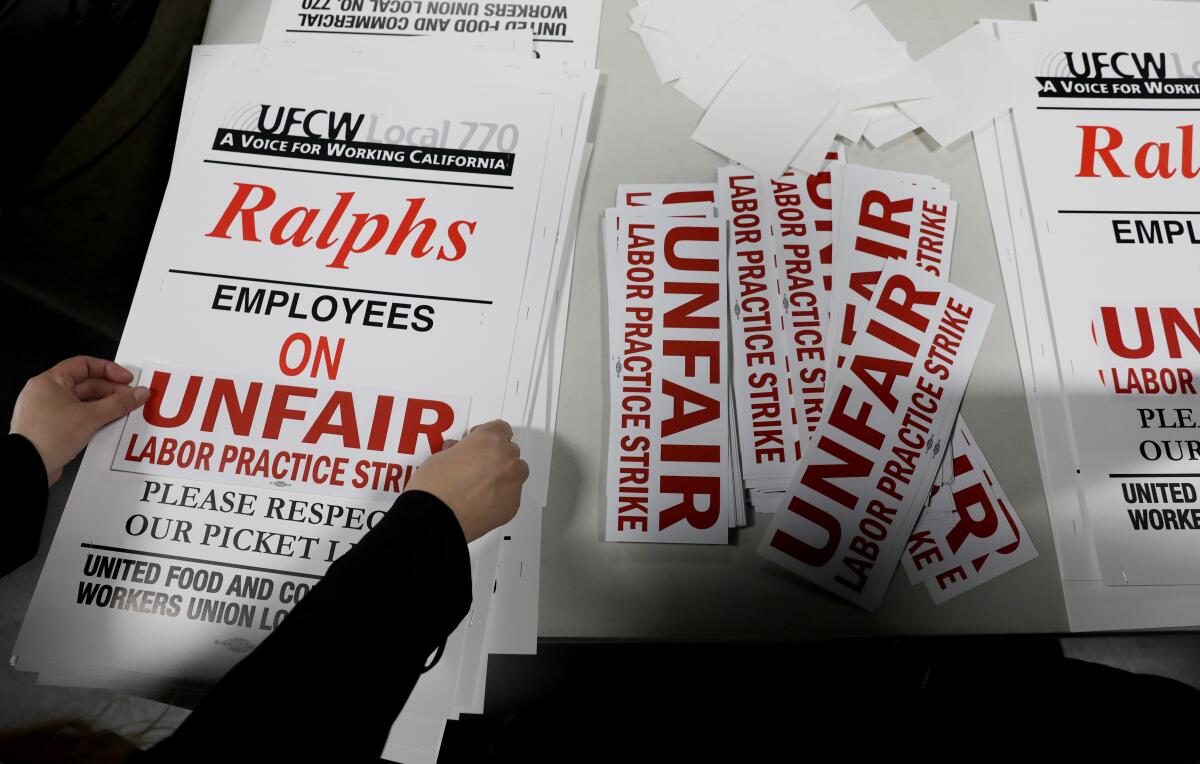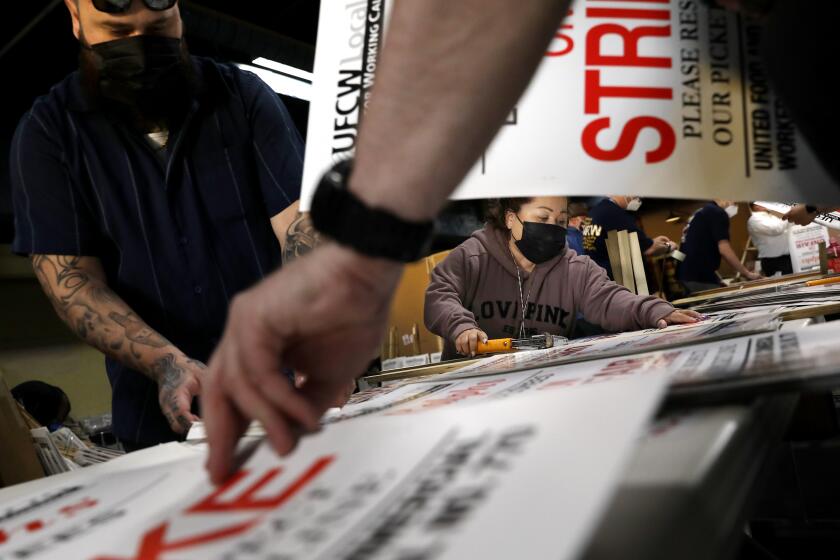DOGE layoffs of federal mediators leave grocery chain talks and other labor disputes in limbo

- Share via
In late March, Isael Hermosillo received an ominous message from his supervisor around 7 a.m. ordering him to cancel all his meetings scheduled that day.
Hermosillo rushed to notify several locals of the United Food and Commercial Workers union as well as attorneys for Albertsons and Kroger that he would not be able to attend a session in Buena Park later that morning — the third consecutive meeting set to be held that week for labor talks between major Southern California grocery chains and unions representing their workers.
Two hours later, Hermosillo found himself on a video conference call where he was informed by his supervisor that he would be put on a monthlong paid administrative leave, and that his job would be terminated.
Hermosillo is among 130 federal mediators who were fired on March 26 after the Trump administration’s cost-cutting team, called the Department of Government Efficiency (DOGE), effectively shuttered a 79-year-old federal agency that mediates labor disputes.
The terminations at the agency, the Federal Mediation and Conciliation Service, have fueled concern among unions and employers alike about who will step in to help ease labor conflicts in Southern California and beyond.
Though relatively small and obscure, the agency plays a vital role in helping to settle disputes so as to avoid labor unrest that can disrupt the free flow of commerce, according to former federal mediators and experts.
Besides brokering negotiations for private employers, the mediators handle worker grievances; train joint labor-management committees; appoint arbitrators if a dispute cannot be resolved; and assist with negotiation impasses in the federal sector. These services are offered at little to no cost.
“We are the ones that come in quietly when people are having issues or contract negotiations aren’t working and are falling apart,” Hermosillo said. “We go in and assist, and then move on to the next group that may need our assistance. I think that’s a lot of why the American people don’t know who we are and what we do.”
Hermosillo works out of the agency’s Los Angeles office in Glendale, staffed by five mediators and a supervisor.
His termination caught employers and unions off guard — coming weeks after the labor contracts covering some 55,000 unionized grocery workers in California had expired — and threw a wrench in negotiations, said Kathy Finn, president of UFCW Local 770.
Finn said that because Hermosillo has worked on negotiations for many years, on multiple cycles since around 2017, both sides trust him and they engage him very early on in the process — which has helped to avert strikes.
“We always have difficult negotiations with these companies. ... We’ve gotten very close to going on strike many times, ending or reaching a deal minutes or hours before a deadline — or after,” Finn said. “The help Isael has provided has been very valuable.”
UFCW Local 770 is among seven locals representing workers from San Diego to Santa Barbara in labor talks with Albertsons, parent owner of the Vons and Pavilions chains, and Kroger, which owns Ralphs.
Workers across 540 Ralphs, Albertsons, Vons and Pavilions stores vote to authorize a strike amid impasse in bargaining over wages, safety regulations.
Finn said mediators like Hermosillo are highly effective. Without them, negotiations can break down into finger-pointing rather than become productive sessions focused on the substance of a contract, Finn said.
Neither Kroger nor Albertsons returned requests for comment.
DOGE and the U.S. Office of Management and Budget also did not respond to requests for comment.
Last week, UFCW joined a dozen major unions in bringing a lawsuit against the Trump administration to reverse the closure of the federal agency. The lawsuit, filed in federal court in the Southern District of New York, argues that the Trump administration’s dismantling of the mediation service is in “clear defiance” of Congress’ constitutional powers to create and dissolve such agencies.
In fiscal 2024, the agency, which has a budget of $54 million, employed about 143 full-time mediators who conducted more than 5,400 mediated negotiations and provided some 10,000 arbitration panels. And recent estimates show that the mediators’ services save the economy more than $500 million annually, according to the lawsuit. The lawsuit cites data from the agency’s website that have been scrubbed in recent weeks.
Just five mediators and a few support staff workers remain at the agency after the cuts, according to the lawsuit.
Some major employers and trade associations have been petitioning the Trump administration to reverse the decision, said Martin H. Malin, a professor emeritus at the Chicago-Kent College of Law and a mediator who served on the Federal Service Impasses Panel during the Obama and Biden administrations.
“No one will talk about this publicly,” Malin said. “They can see this hair trigger mentality in the White House. Everybody is afraid.”
DOGE has said the agency will limit its services to labor disputes that involve more than 1,000 employees. But Malin said even with those restrictions, the workload will be too much for the remaining mediators.
“It’s impossible for four mediators to cover the entire country,” Malin said. “The situation, it’s pretty dire.”
Tina Littleton, another federal mediator in the Glendale office who had worked at the agency for 15 years, was stunned by the decision.
Elon Musk has benefited from his close alliance with Donald Trump, as the president has ousted federal officials who had overseen departments investigating the billionaire’s multiple companies.
“Do I feel this was done correctly or appropriately?” Littleton asked. “My answer is no.”
Littleton recently facilitated negotiations between some 200 workers and their employer, which manufactures plastic pouches used to dispense IV infusions in medical facilities.
“It doesn’t matter to us whether big or small, they still have some part that they play in making sure interstate commerce continues,” Littleton said.
Martha Figueroa, a field representative who helps the California Federation of Teachers negotiate contracts, said she has frequently relied on a federal mediator in discussions with Head Start, the child development nonprofit targeted by the Trump administration for funding cuts. She worries about potentially having to turn to private mediators, who are “really, really expensive.”
“When you have a private mediator, it’s very stressful to both parties,” Figueroa said. “The more you’re at the table, the more they get paid. And that’s not the case when you have a public mediator.”
Amid news of visa cancellations and deportations, state and local tourism officials are increasingly worried about the potential adverse effects on travel to Los Angeles and California.
Rather than saving money, dismantling the agency will create more inefficiencies, said William Resh, associate professor of public policy and management with USC’s Sol Price School of Public Policy.
“What you have without mediation are disputes that are going to be more prolonged, more contentious,” Resh said. “These are highly professionalized individuals with a lot of experience in bargaining and conflict negotiation.”
California and several other states are exploring how they might fill the gap.
California’s Public Employment Relations Board, which oversees disputes between state workers and their employers, also has the authority to offer mediation services to private employers, but it doesn’t have the budget to do so, said Lorena Gonzalez, head of the California Labor Federation. Labor groups have been pushing state lawmakers in budget talks to augment the board’s budget by several million dollars, she said.
“In the long run the state does benefit. We don’t want people to go on strike. Sometimes, it’s needed, but for the most part, if mediation is able to help get a good resolution, we prefer that,” Gonzalez said.
More to Read
Inside the business of entertainment
The Wide Shot brings you news, analysis and insights on everything from streaming wars to production — and what it all means for the future.
You may occasionally receive promotional content from the Los Angeles Times.














